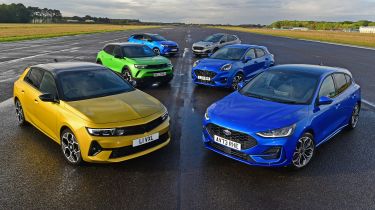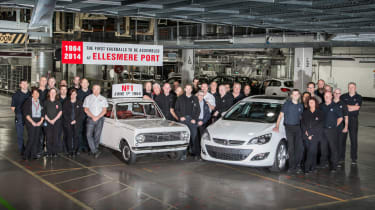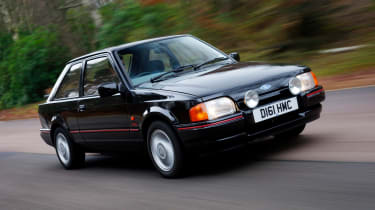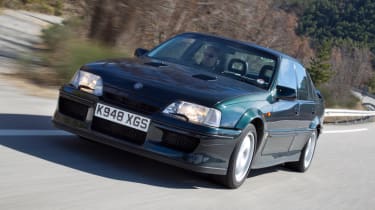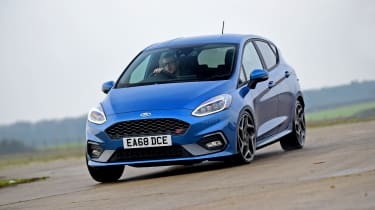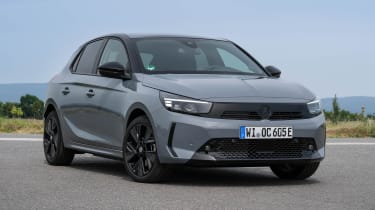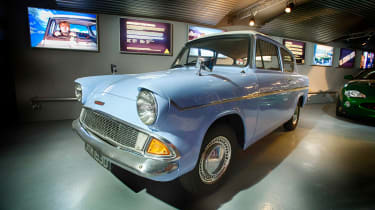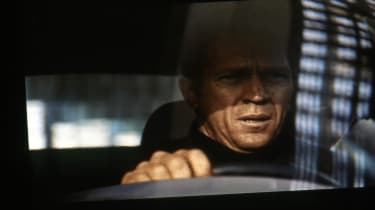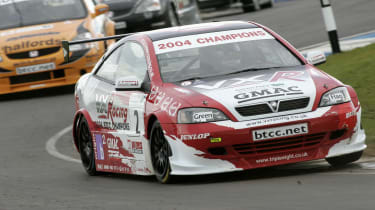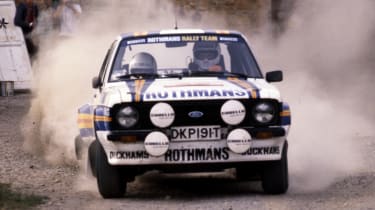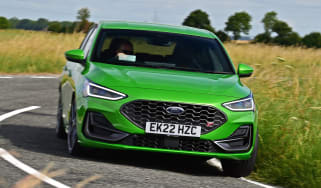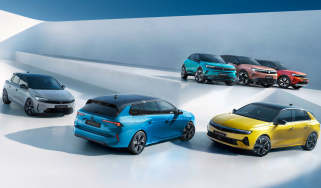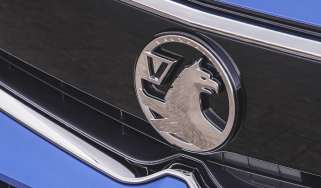How Ford and Vauxhall became national treasures
We take a look at the rivalry of two manufacturers that have battled for the hearts, minds and money of British car buyers
Britain thrives on rivalries. Little gets the juices flowing more than a head to head that captures the national interest. Think Blur vs Oasis. Coronation Street vs EastEnders. Or even Tyson Fury vs Anthony Joshua. In the automotive arena, though, there is unquestionably one rivalry that towers above all others: Ford vs Vauxhall.
These masters of mainstream cars have traditionally ruled the sales charts, meaning there must be few British families that haven’t owned – or at least travelled in – a vehicle from one manufacturer or the other at some point.
Over the next four pages, we take a look at how these two automotive titans have become inextricably linked, while being such a familiar presence on our roads.
History
Both Ford and Vauxhall started manufacturing cars in 1903, but have taken wildly divergent paths to dominate the UK market. Ford Motor Company was founded in Dearborn, Michigan, USA, with the Ford of Britain subsidiary formed in 1909. From the outset, the brand’s focus was on producing cars with mass-market appeal.
The firm’s first vehicle manufacturing plant outside the US was opened in Trafford Park, Manchester in 1911 and it went on to establish other facilities in Dagenham, Essex, Halewood in Merseyside, and Bridgend, South Wales, as it became Britain’s biggest selling car manufacturer.
Sadly, by 2013 it no longer made any vehicles in the UK, following the closure of the Transit van assembly factory in Southampton. Dagenham still churns out diesel engines and Halewood produces transmissions.
Vauxhall takes its name from the area of South London in which it was founded in 1857, where it initially produced pumps and marine engines as the Vauxhall Iron Works company. Once cars emerged as its focus, it became known as Vauxhall Motors in 1907, although in the early days it concentrated on more desirable sporty models rather than the more modest offerings favoured by Ford.
America’s General Motors purchased Vauxhall in 1925, and the manufacturer’s shift to the mainstream area of the car market – which had already started – gained momentum. GM ownership continued until 2017, when Groupe PSA took over. Its subsequent merger with Fiat Chrysler Automobiles in 2021 saw Vauxhall become part of the newly formed Stellantis group.
Vauxhall’s Ellesmere Port plant in Cheshire became known as the home of the Astra, and is now undergoing a £100million upgrade to produce solely battery-electric models. For many people, though, the brand is synonymous with Luton, Beds, where a manufacturing facility has been in operation since 1905. It currently produces the Vivaro van, plus commercial vehicles for other Stellantis marques.
The key models
Picking the most significant cars from each manufacturer is no easy task, given that both have such long, illustrious histories in the UK. But from a Ford point of view, it’s impossible to start anywhere other than the Fiesta, the supermini that has the enviable status of being Britain’s most owned car of all time. Since its launch in 1976, nearly five million have found homes across the country, prior to production ending in July this year.
An honourable mention must also go to a vehicle whose name has become so familiar that it has virtually emulated the likes of Hoover, Sellotape and Tupperware in becoming recognised more as a generic term rather than a specific product name. Step forward the Transit, the beloved transport of the white van man (and woman) countrywide.
Rounding off our selection of key Fords is the Escort, the compact family car that sold around 4.1 million in the UK across six generations between 1968 and 2000. It’s hard to overstate the shock that greeted the news that it was being discontinued at the turn of the century, although its successor, the Focus, proved a pretty handy replacement.
From a Vauxhall perspective, it’s easy to overlook just how long the Astra has been a staple of our roads. Launched as a replacement for the Viva and a rival to the Escort an astonishing 43 years ago in 1980 – for perspective, this was the year when Ronald Reagan won his first term as US president and Beatle John Lennon was assassinated – it immediately shot to the top of its class, and it has remained hugely popular across eight generations. That familiarity with the nameplate is likely to serve Vauxhall well, now that an all-electric Astra is available.
The same can be said of the Corsa, the supermini that has sold more than 2.3 million since its introduction in Britain in 1993. With a facelifted version now available to order, more sales success is guaranteed. However, one of Vauxhall’s most significant models of the past was the Cavalier, a large family car-cum-repmobile that arrived in 1975 and capitalised on the public’s dissatisfaction with British Leyland’s failing product range of the time, to grab sales and become a major hit with buyers. The Cavalier lasted 20 years across three generations and spawned a wide array of different versions, from performance cars to estates.
Performance cars
One of the central pillars of both manufacturers’ appeal has been their ability to sprinkle some stardust on normal everyday cars and produce a string of affordable and desirable performance models, many of which have achieved legendary status among enthusiasts.
Everyone has their favourites, but from the Ford stable you’d have to be churlish to ignore the Escort Mexico from 1970. Built to celebrate the Escort’s win in the London to Mexico Rally, it only had an 85bhp 1.6-litre engine, but it featured a stiff bodyshell from RS models and was great fun to drive. Its sporty graphics still look fantastic today, too.
Much more menacing was the Sierra RS500 Cosworth that was first seen in 1987 and is the very definition of a lairy eighties hot hatch. The first Ford to wear the esteemed Cossie badge, it pumped out 224bhp from its 2.0-litre turbo engine, while its huge rear spoiler and deep front bumper endowed the model with an unmistakable look.
And in recent years the marvellous Fiesta ST has demonstrated that power and price do not dictate how enjoyable a car is to drive, with its rev-hungry three-cylinder engine and wonderful agility making it a true delight.
Vauxhall’s winners include the Lotus Carlton, a 1990 version of the saloon that the Norfolk manufacturer – which was also owned by General Motors at the time – fitted with a 377bhp twin-turbo straight-six engine. The result was a monumentally fast 5.4-second 0-60mph time and a 176mph top speed, which outraged some people enough that there were calls for the Lotus Carlton to be banned.
Also closely linked to Lotus was the VX220 roadster of 2000, which shared much with the sublime Elise. Underappreciated at the time, it’s now rightly considered a modern classic, especially if you can source one from 2003 onwards with a turbo 2.0-litre engine from the Astra GSi.
Another eighties Vauxhall hot hatch favourite was the Astra GTE, particularly the 1988 version, known as the ‘redtop’ on account of red L-shape detailing on the cover of its 16v 150bhp engine. A 0-60mph time of 7.4 seconds kept boy racers happy from Aberdeen to Aberfan.
Sales
The rise of the Vauxhall Corsa to become Britain’s biggest-selling car of 2021 was a truly seismic event – because it marked the first time since 1971 that a model from Ford hadn’t been top of the annual sales chart in the UK.
While the Griffin has regularly had multiple models in the yearly top-10 lists, it’s Ford that can rightfully claim to have established itself as the country’s biggest car maker, courtesy of a run of unbroken success spanning five decades.
Using Society of Motor Manufacturers and Traders’ registration data, Britain’s annual number ones from 1972 onwards were – take a deep breath – the Cortina Mk3 (1972-1975), Escort Mk2 (1976), Cortina Mk4 (1977-1979), Cortina Mk5 (1980-1981), Escort Mk3 (1982-1985), Escort Mk4 (1986-1989), Fiesta Mk3 (1990-1991), Escort Mk5 (1992-1994), Escort Mk6 (1995), Fiesta Mk4 (1996-1998), Focus Mk1 (1999-2004), Focus Mk2 (2005-2008), Fiesta Mk6 (2009-2017) and the Fiesta Mk7 (2018 2020).
However, it’s worth pointing out that wearing a Ford or Vauxhall badge is no guarantee of sales success. In the past decade alone, we have seen a number of models fail to find favour with buyers, including Ford’s US-derived Edge SUV and B-Max mini-MPV, plus Vauxhall’s Cascada convertible and the rather puzzling ‘hot’ Meriva VXR.
In popular culture
The ubiquity of Fords and Vauxhalls in the UK means they have become a common sight on our screens over the years – and it’s probably fair to say that models from the blue oval have landed the sexier roles.
Cynics might argue that’s been down to a more generous product placement budget; that certainly explained Daniel Craig’s surprise stint behind the wheel of a Mk4 Mondeo in the 2006 James Bond movie Casino Royale.
Ford’s US background has ensured a string of appearances by American models in Hollywood blockbusters. But here in Britain, high-profile castings have included the Zephyr in the massively popular sixties cop show Z-Cars, and a Consul GT in The Sweeney, a seventies drama about the Metropolitan Police’s Flying Squad.
Then there was the much lusted-after Capri of Bodie and Doyle in The Professionals, an eighties series about a fictional British government agency called CI5. More recently a flying Ford Anglia starred in 2002’s Harry Potter and the Chamber of Secrets film, while the copper-brown Cortina that featured in 2006’s Life On Mars became one of the BBC programme’s biggest talking points.
Vauxhall’s CV is more modest in comparison, but it claws back some genuine kudos for the key role of a 1960 Cresta in the iconic 1981 music video for Ghost Town by The Specials, hailed by the Guardian in 2020 as Britain’s second greatest number-one single ever.
Just over a decade later, the Lotus-tuned version of Vauxhall’s Carlton lit up television screens across the country in the ITV series Sharman, starring Clive Owen.
Meanwhile, the sixth-generation Astra’s spell on BBC’s Top Gear for the Star in a Reasonably Priced Car feature guaranteed massive exposure for three series from June 2013 onwards.
Advertising
Clever advertising that has captured the imagination has ensured that awareness of Ford and Vauxhall extends far beyond the traditional car-buying audience.
With sizeable budgets to hand and the pick of the country’s finest agencies, the pair has come up with many memorable campaigns on TV, online and in print.
Who can forget, for example, Ford’s recreation of actor Steve McQueen from the classic 1968 movie Bullitt to promote the Puma coupe in 1997? The ingenious blending of past and present to replicate the film’s famous car chase in San Francisco produced a truly inspirational TV commercial that registered with everyone who saw it.
The company has also been responsible for some unforgettable slogans that have entered the national lexicon, such as “The Nation’s Favourite” and the Transit van’s billing as “The Backbone of Britain”.
Vauxhall’s promotion of the mini-MPV and compact MPV sectors resulted in that rarest of beasts, a TV car ad that resonated with genuine humour and warmth. The idea was simple – two youngsters extolling the virtues of the Meriva and Zafira as if they were ‘junior dads’ – but the execution was hugely effective.
The brand’s highlighting of its British roots in recent years has also struck a chord with many, particularly in the post Brexit landscape.
But there have been one or two missteps. An online campaign that billed the Ford SportKa as the “Ka’s evil twin” and saw its sunroof decapitate a cat upset many, while it’s hard to imagine how Vauxhall arrived at the idea of advertising the thrilling VX220 roadster with an unfunny boffin played by Griff Rhys Jones in his pants.
Motorsport
As with many manufacturers, motorsport has proven appealing for Britain’s big-two car makers, although Ford’s global footprint has given it a higher profile.
Its success making engines in Formula One – where Ford helped claim 10 constructors’ championships, 13 drivers’ championships and 174 Grand Prix victories – enhanced its reputation among the UK’s car buyers.
There have also been wins at Le Mans, most famously by the GT40, and title victories in the World Rally Championship for the Escort RS1800 and Fiesta WRC.
And there is a lengthy roll of honour in the British Rally Championship, where accomplished machines including the Escort RS1600, RS1800, Sierra RS Cosworth and Fiesta R5 have all claimed title wins.
With General Motors at the helm, Vauxhall’s German sister company Opel was often the US giant’s preferred route into global motorsport, although the Vauxhall Chevette HS and Chevette HSR rally cars of the late seventies did make an impact across Europe, with the latter taking the British Rally Championship in 1979.
Generally, though, Vauxhall has focused on domestic competition, where it has enjoyed particular success in the British Touring Car Championship.
Between 2001 and 2009, the marque won an impressive eight out of nine BTCC titles with the Astra Coupe, Astra Sport Hatch and Vectra, while there were drivers’ gongs for Jason Plato, James Thompson, Yvan Muller and Fabrizio Giovanardi.
With many of these BTCC seasons screened on ITV, participation proved a great window for Vauxhall to showcase the potential of its cars to viewers.
Ford vs Vauxhall
- How Ford and Vauxhall became national treasures
- Focus vs Astra
- Puma vs Mokka
- Kuga vs Grandland
- Transit Custom vs Vivaro
Find a car with the experts
